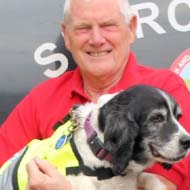Dogs can predict owners epileptic seizures, study finds

Pictured: Dr Neil Powell with dog Fern.
New research has suggested that dogs have the ability to predict epileptic seizures before they happen.
The study, led by Queen's University Belfast, analysed the reaction of dogs to odours, and found that the dogs they studied could predict an oncoming epileptic seizure.
Following anecdotal accounts of pet dogs possessing the ability to predict their owner's epileptic seizures with attention-seeking behaviours, the study aimed to investigate the accuracy of these claims, and is the first scientific study to do so.
Published in the journal MDPI Animals, the study involved 19 pet dogs with no previous experience of epilepsy, and researchers exposed these dogs to odours characteristic of three seizure phases, using sweat collected from people with epilepsy.
Researchers found that all 19 of the dogs demonstrated more affiliative behavioural changes when exposed to the seizure-associated odours in comparison to their response to control odours.
Lead Researcher Dr Neil Powell, from Queen's University Belfast's School of Biological Sciences, explained the project: “We hypothesized that, given the extraordinary sense of smell of dogs, a volatile organic compound exhaled by the dog’s epileptic owner may provide an early warning trigger mechanism to which make dogs react before the seizure. The results have shown pet dogs to be a reliable source to detect an on-set seizure.
“Our findings clearly showed that all dogs reacted to the seizure-associated odour whether this was through making eye contact with their owner, touching them, crying or barking. There is a unique volatile smell linked to epileptic seizures, detectable by dogs who can in-turn warn their owner a seizure is likely to occur.
“Our research was based on pet dogs with no prior training. If we can train dogs, this has the potential to make a big difference to owners who experience unpredictable seizures and should go a long way in improving not only their safety, but also their quality of life.”
The research was funded by Epilepsy Ireland and Disability Assistance Dogs, and was conducted in partnership with these organisations.



 The Veterinary Medicines Directorate (VMD) is inviting applications from veterinary students to attend a one-week extramural studies (EMS) placement in July 2026.
The Veterinary Medicines Directorate (VMD) is inviting applications from veterinary students to attend a one-week extramural studies (EMS) placement in July 2026.